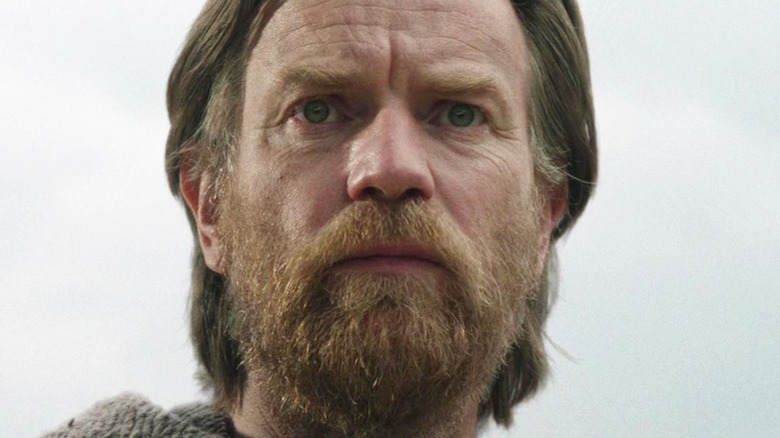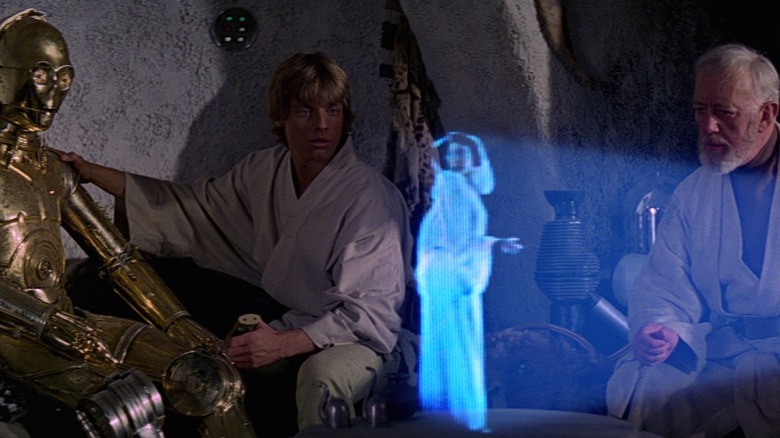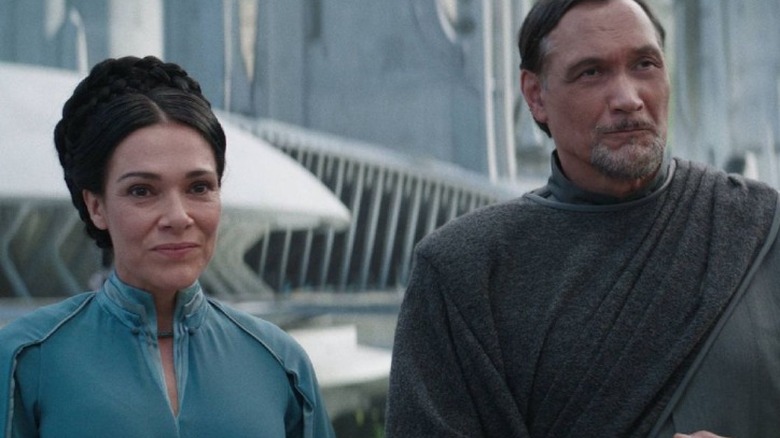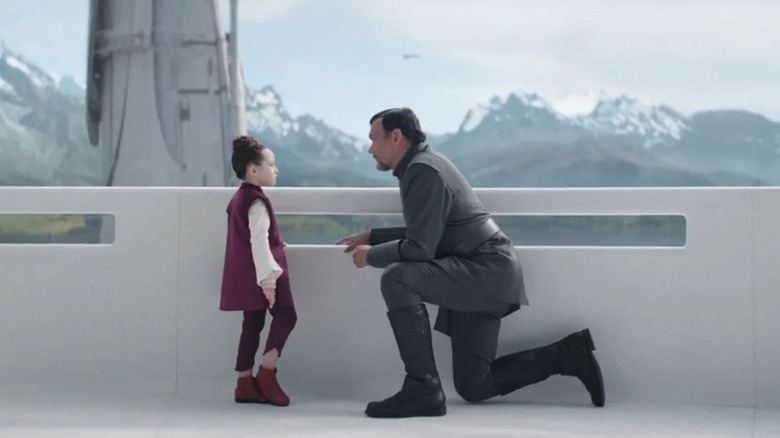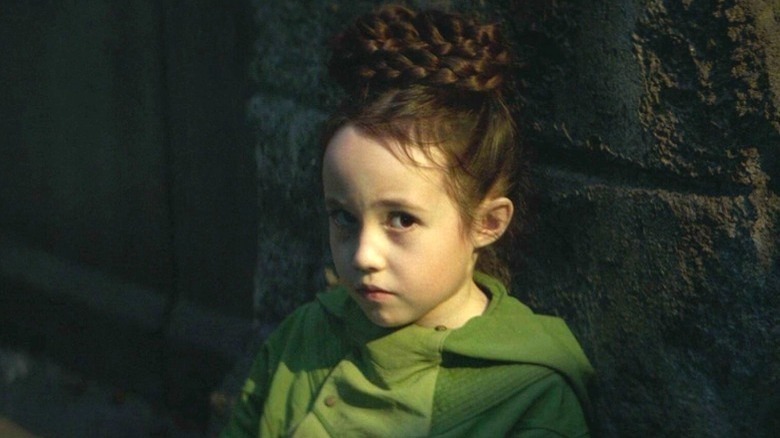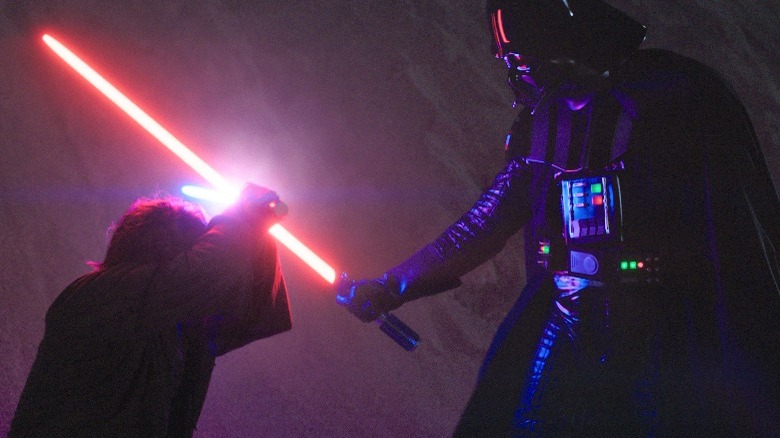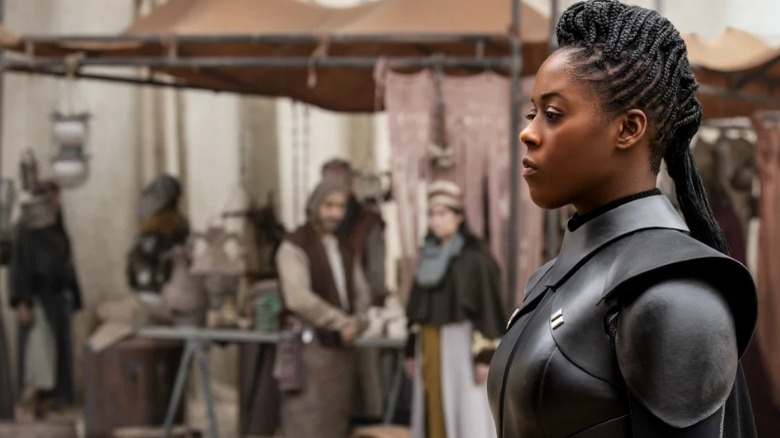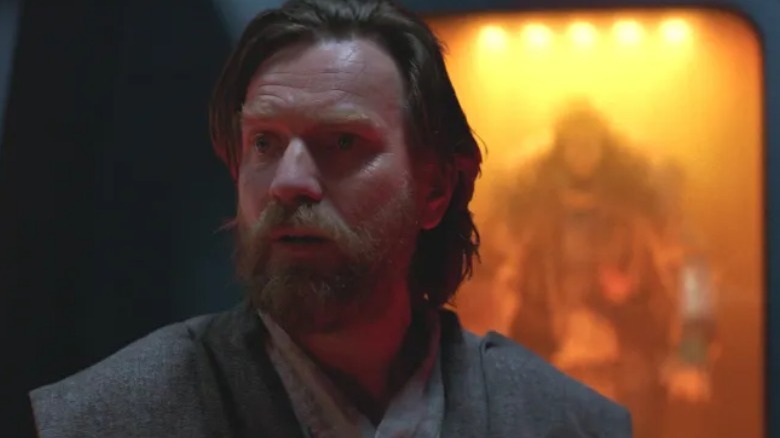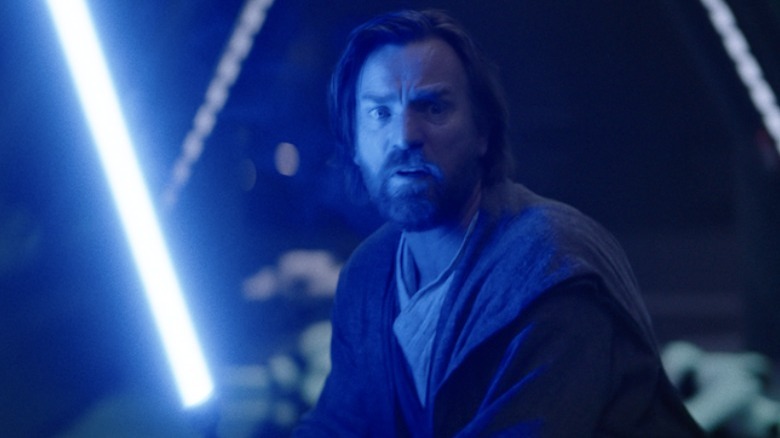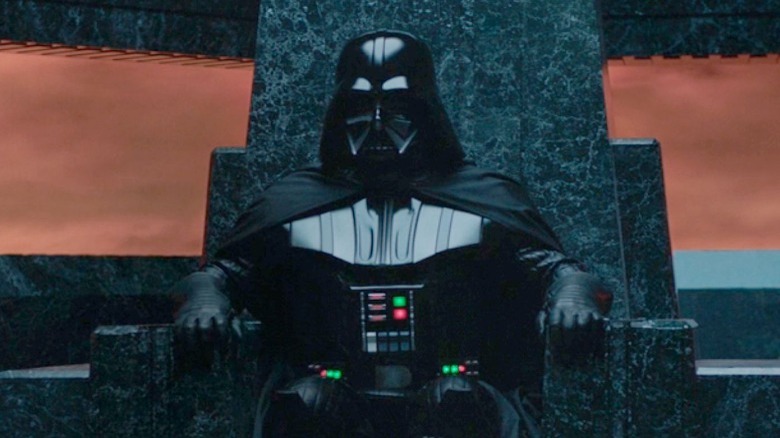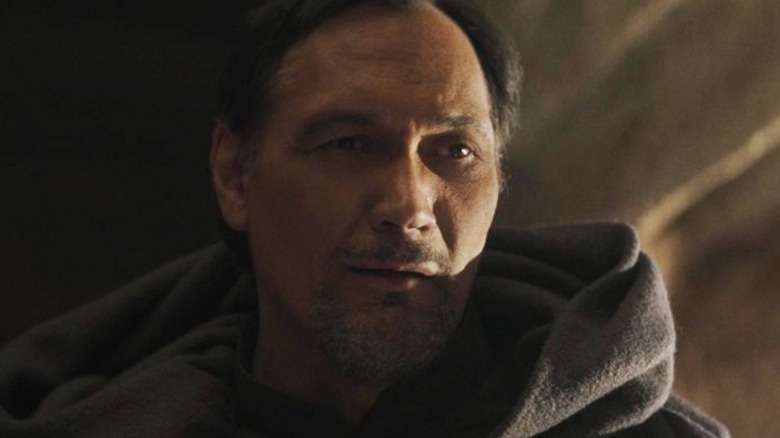Plot Holes Created By The First Season Of Obi-Wan Kenobi
Season 1 of "Obi-Wan Kenobi" brings new dimension to the entire "Star Wars" story. A decade has passed since the Republic fell, and the Empire is steadily hunting down the last remnants of the Jedi Order. Obi-Wan Kenobi, cut off from the Force, lives a lonely life in a dusty Tatooine cave. But the Jedi Master's meager existence changes when Bail Organa turns up, begging him for help. Little Princess Leia has been kidnapped, and Obi-Wan is the only one who can rescue her. Little does he know that in agreeing to find the girl, he's signing up to confront the darkest corners of his own past.
Fans were thrilled to spend more time with so many major players of the "Star Wars" saga. But "Obi-Wan Kenobi" also leaves many confusing questions in its wake. Continuity gets scrambled, characters' relationships are altered, and Obi-Wan himself makes a few choices even the most diehard fans are at a loss to explain. These are the biggest plot holes created by Season 1 of "Obi-Wan Kenobi."
Leia's confusing connection to Obi-Wan
Leia and Obi-Wan's relationship is a key part of "Obi-Wan Kenobi." It might also be the cause of the series' biggest plot hole. Though Leia doesn't initially trust Obi-Wan, she quickly develops a fondness for the aging Jedi Master, who clearly intends to protect her well-being at all costs. By the end of the series, Leia cares so deeply for Obi-Wan, she's hugely concerned about his decision to lead Darth Vader and his minions away from the rest of the Path. When he returns, she's overwhelmed with happiness.
At the beginning of "A New Hope," grown-up Leia sends a message through R2-D2 to Obi-Wan Kenobi, which references his time serving her father during the Clone Wars. While she clearly understands that Obi-Wan is skilled and important enough to be worth contacting, she doesn't display any affection for the Jedi Master. As "Obi-Wan Kenobi" establishes that he risked everything to save her roughly 10 years prior, this is strange. Leia isn't a stranger to Obi-Wan — she's an old, dear friend. What we get, however, is Leia building a connection by reminding Obi-Wan of his service to her father. If Obi-Wan used the Force to wipe her memory of the series' events, this might make sense ... but that doesn't happen.
The Organas' place within the Empire
Learning that Bail and Breha Organa work for the Empire is a bitter pill to swallow. We know what you're going to say: What choice do they have? But in fact, other "Star Wars" stories see the Organas behave very differently. When Leia records her message to Obi-Wan in "A New Hope," she begins by reminding Obi-Wan that he once served her father. "Now," Leia continues, "he begs you to help him in his struggle against the Empire." This implies an open and concerted struggle is ongoing. The events of "Rogue One" support this statement, as Bail Organa is clearly seen as a rebel in that film.
But according to "Obi-Wan Kenobi," the Organas play ball with the Empire. Nothing indicates a fall from grace in the eyes of the Empire, either — they're solidly in the bad guys' good graces. The Grand Inquisitor is even fearful of messing with the Organa family, because of their standing within the Empire. At what point do the Organas put the entire planet in Grand Moff Tarkin's crosshairs? Something must drastically change for him to feel completely comfortable obliterating Alderaan with the flick of a switch, but we have no indication what that might be. While this story may yet be told, its absence currently constitutes a major plot hole.
The Empire fails to exploit Obi-Wan's bond with the Organas
Obi-Wan is forever tied to his Padawan's twin children. He feels a personal sense of duty towards these youngsters, but he also understands how important they might become in an epic clash with the Empire. After Leia is kidnapped in "Obi-Wan Kenobi," Bail begs his Jedi comrade to bring her home. Obi-Wan agrees, and sets off on a mission with the potential to define his post-Republic life.
Leia's kidnapping is organized by Inquisitor Reva Sevander, who is trying to lure Obi-Wan out of hiding (and also happens to be one of the best things about "Obi-Wan Kenobi" as a whole). The Grand Inquisitor admonishes Reva for this move, as he recognizes the Organas as vital figureheads within the Empire. However, he also acknowledges that her plan works, and intends to take the credit. That Obi-Wan has a connection to the Organas is clearly an established fact among some members of the Empire. Exploiting it is now a proven path to success. So ... what's going to stop them from exploiting it again, in order to draw out the seasoned Jedi? Just because he defeats Vader in combat and delivers Leia back to her family doesn't mean Obi-Wan is suddenly forgotten by the bad guys, who are still ravenously hunting Jedi and their sympathizers. Yet that's apparently what happens.
No one senses Leia's connection with the Force
During the Empire's hunt on Tatooine, Obi-Wan and Owen express concern that Luke's Force capabilities might be detectable. The last thing anybody wants is for the Empire to find the long-lost children of Anakin Skywalker. This is a long-running fear: At the end of "Revenge of the Sith," Yoda, Bail, and Obi-Wan agree to split the children up and hide them away where the Sith can't sense their presence. A person doesn't need to actively manifest their abilities for their fellow Force users to locate them, especially when they're in close proximity.
So why don't the bad guys sense Leia's Force powers? If you think Leia isn't using them throughout this series, you might want to go back and re-watch. No, she doesn't make things fly through the air, but she has a certain wisdom affixed to her spunky attitude that isn't simply advanced intellect. Deft judgement and keen awareness are gifts granted by the Force, and a 10-year-old displaying these qualities is basically a giant neon sign to fellow Force users. Moreover, Leia comes very physically close to Vader when Reva interrogates her. Throughout the original movie trilogy, Vader can always sense Luke when he's nearby. Given the established lore, it's hard to believe no Empire Force user can tell there's something special about Leia — not even her biological father.
Obi-Wan's refusal to kill Vader
A climactic duel between Obi-Wan and Vader was always in the cards for "Obi-Wan Kenobi." This fight had to be executed properly, given what we know about the past, present, and future of "Star Wars" canon. The moment arrives ... and Obi-Wan refuses to administer a fatal blow to Vader. How could he? Vader is obviously a massive presence in the later story. But why put Obi-Wan in the position of even having the choice to walk away?
This fight establishes that Anakin is completely dead to Obi-Wan. With this understanding comes Obi-Wan's conviction to defeat Vader. He has every reason to kill the Sith Lord in this moment and zero reasons to leave him alive. Don't forget, Obi-Wan previously believed he killed Anakin/Vader in their final duel on Mustafar. Even if he had reservations about killing his former Padawan, he absolutely thought he left him to burn alive on that fiery planet. Now, Obi-Wan establishes that he has no reservations ... but still allows Vader to draw breath. This move becomes even more confounding when you remember that Obi-Wan eventually pushes Luke to kill Vader because the man he was is already dead — logic he ignores in "Obi-Wan Kenobi."
Reva and the Grand Inquisitor's survival
"Obi-Wan Kenobi" is filled with restraint. Obi-Wan doesn't kill Vader. Reva doesn't kill the Grand Inquisitor. Vader doesn't kill Reva. See the trend? Now, Reva seemingly kills the Grand Inquisitor while pursuing Leia and Obi-Wan. Her deception towards Vader is revealed when the Grand Inquisitor, who survived her attack, informs Vader of everything. In return, Vader stabs Reva and leaves her to die.
In the world of "Star Wars," Darth Maul can be chopped in half and live to tell the tale, thanks to the power of his hatred. But the many survivals of "Obi-Wan Kenobi" are a bit too hard to swallow. This is especially true for Reva and the Grand Inquisitor, as both of them suffer the same sort of blow that kills Qui-Gon Jinn and Han Solo. This wound ends a Jedi Master and a legendary smuggler, but somehow, Reva gets up and finds her way to Tatooine with a hole in her gut. Of course, in a world of space wizards and laser swords, disbelief must be suspended. But puncturing torsos left and right only for some afflicted characters to pull a "gotcha!" results in an undeniable plot hole.
Obi-Wan's distance from the Force
After Order 66, Jedi across the galaxy scatter in the hopes of finding safety. Emperor Palpatine fears a reprisal from his greatest foes, but with most of the Jedi dead, the odds are stacked heavily against any survivors. On the surface, it makes sense that Obi-Wan cuts himself off from the Force, in order to stay hidden. But given the circumstances of his exile, this also seems incredibly short-sighted.
For starters, he mentions to Owen that he intends to train Luke. How can he do that while disconnected from the Force? Additionally, at the end of "Revenge of the Sith," Yoda tells Obi-Wan he has more training to do, and that he'll learn how to commune with his master, Qui-Gon Jinn, from beyond the grave. But according to "Obi-Wan Kenobi," Obi-Wan takes a decade-long break from all things Force-related and then receives a seemingly random visit from his master in the series' final moments. Furthermore, how does Obi-Wan intend to protect Luke with his diminished skills? Withdrawing from the Force makes a certain amount of sense for most Jedi, but not Obi-Wan. He has too many specific duties to fulfill.
Obi-Wan should know that Anakin is alive
For 10 years, Obi-Wan lives with the belief that he left his Padawan for dead. He's shocked to learn in "Obi-Wan Kenobi" that Anakin is, in fact, alive. At first glance, Obi-Wan's surprise is understandable: Who could live through being roasted like a marshmallow? However, this revelation contradicts something essential: Obi-Wan already knows Anakin is Darth Vader. In "Revenge of the Sith," he and Yoda watch a hologram recording in which Palpatine openly refers to Anakin as Lord Vader. Obi-Wan is clearly shaken by this.
Obviously, this conflicts with the show's story. It's not the only thing that does, either. Darth Vader is second-in-command of the entire Empire. "Obi-Wan Kenobi" makes it clear he's a widely-feared face (or helmet) of the regime: Most of the Imperial commanders who wreak terror and havoc across the galaxy do so at Vader's behest. Nobody gets to ignore the Empire at this point in the story, which means Vader is one of the most well-known figures in the galaxy. He might be cooped up on a remote world, but even Obi-Wan couldn't remain ignorant of Vader's existence.
Vader lets the Path escape
The Path is a powerful and organized network of Jedi sympathizers. This should put them in Vader's sights, but in fact, Vader allows the Path to escape in "Obi-Wan Kenobi." Now, Vader and the Grand Inquisitor do pursue the Path in a Star Destroyer, which, let's not forget, is outfitted with a fleet of TIE fighters. But in the end, Vader only has eyes for Obi-Wan. This is thematically resonant, but it also makes no sense. Refusing to go after the Path takes more effort on Vader's part than just doing so.
Firstly, Vader could have followed Obi-Wan while dispatching TIE Fighters to bring down the Path. Secondly, Vader doesn't even continue chasing Obi-Wan in the Star Destroyer: He disembarks on his own shuttle. We're apparently expected to believe the Grand Inquisitor watches Vader fly away and lets the Path disappear. What's worse, Vader's advisors don't explain this obvious blunder to him. The Empire simply has too many resources at their disposal to make any plan that doesn't pursue both targets sensible.
How is Bail Organa not charged with treason?
Reva is initially the only one who knows that Obi-Wan and the Organas have a connection. When her use of Leia as bait to lure Obi-Wan Kenobi into a trap proves effective, the Grand Inquisitor tells her he plans to take credit for it. She strikes him down, but he survives. The Grand Inquisitor goes on to tell Vader that Reva tried to kill him, and clearly clues the Sith Lord into the circumstances of her plot.
By the series' end, the Organas' connection to Obi-Wan is no longer a secret. The entirety of Imperial leadership seems likely to know about it, in fact. But even though this regime is bent on killing Jedi and those who aid them, Vader and the Grand Inquisitor don't take this opportunity to make Bail Organa into a very public example and charge him with treason against the Empire. This is exactly the type of tactic the Empire loves, which makes their inaction baffling. Of course, they do go on to destroy Alderaan, but why bother to wait at all?
